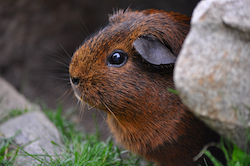BY ALLISON KOZICHAROW; EDITED BY BERNICE BORN
(Archived story. Original version is here.)
Do animals have the power to benefit human health?
For the past 10 years the National Institutes of Health (NIH) has funded an ongoing range of studies focused on humans’ relationships with animals. NIH reports that “Scientists are looking at what the potential physical and mental health benefits are for humans from different animals — from fish to guinea pigs to dogs and cats.”
Studies indicate that “[I]nteracting with animals has been shown to decrease levels of cortisol (a stress-related hormone) and lower blood pressure. Other studies have found that animals can reduce loneliness, increase feelings of social support and boost mood.”
Another study demonstrated “that children with autism spectrum disorder were calmer while playing with guinea pigs in the classroom. When the children spent 10 minutes in a supervised group playtime with guinea pigs, their anxiety levels dropped. The children also had better social interactions and were more engaged with their peers. The researchers suggest that the animals offered unconditional acceptance, making them a calm comfort to the children.”
Health agencies worldwide embrace the concept of “One Health,” which recognizes that human health is connected to the health of animals and the health of the environment. WiRED believes in the One Health critical view and is configuring its training programs on global human health to reflect the One Health principles.
WiRED will continue to report on human-animal interaction and to promote One Health and incorporate this approach into its health training programs and its Web outreach material.
Health Benefits to Owning a Pet
An estimated 68% of households in the United States have at least one pet. Studies have shown that the bond between people and their pets can increase fitness, lower stress, and bring happiness to their owners. Some of the health benefits of having a pet include:
- Decreased blood pressure
- Decreased cholesterol levels
- Decreased triglyceride levels
- Decreased feelings of loneliness
- Increased opportunities for exercise and outdoor activities
- Increased opportunities for socialization
- Wash your hands after touching, feeding, or cleaning up after your pet.
- Keep your pet healthy — for example, with regular visits to the veterinarian.
- Practice good pet hygiene — for example, by keeping pets and their supplies out of the kitchen and away from food and drinks.
- Teach children how to interact safely with pets.
- Keep wildlife wild — don’t touch or feed wild animals.
Read More
- WiRED: Wired Marks Publication of Article on One Health; Veterinarians Play Key Role In the Concept of “One Health”; WiRED International Applauds CDC’s One Health; WiRED Marks One Health Day
- Centers for Disease Control and Prevention: Healthy Pets, Healthy People and One Health
- NIH: The Power of Pets
- U.S. Department of Agriculture:
One Health - WHO: One Health


